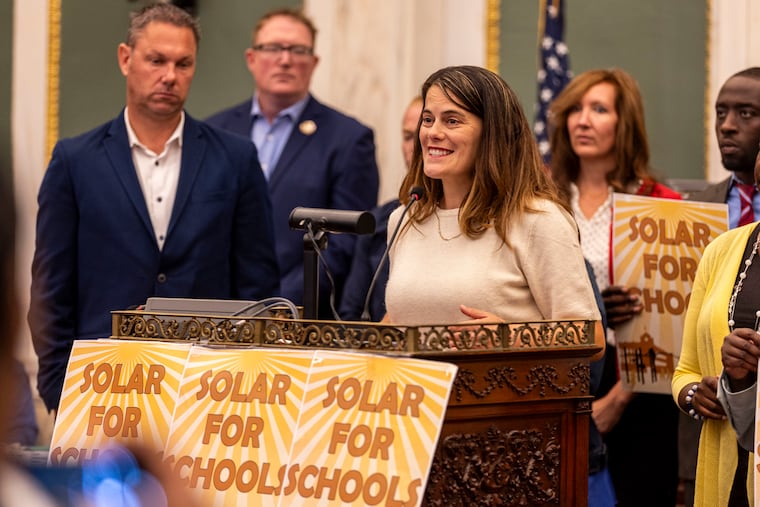Under a new law, state-paid solar panels will soon generate savings for schools in Philly and beyond
“We’re not talking about a few dollars,” said State Rep. Elizabeth Fiedler. “We’re talking about millions of dollars over the life” of the panels.

Coming to a school near you: solar panels on roofs.
School districts, under a new law, will be able to apply for state funds to purchase and install the panels, generating energy savings that can be invested back into classrooms.
State Rep. Elizabeth Fiedler (D., Philadelphia) on Wednesday touted the program she introduced and shepherded through the legislative process, gathering in Philadelphia City Council chambers with lawmakers and labor and environmental leaders for a pep rally of sorts.
“We know that our schools need more resources — they need more teachers, more guidance counselors, up-to-date textbooks, technology, science. They need so much,” said Fiedler, whose children attend a Philadelphia public school.
Solar for Schools will allow any district that wins a grant to reap real benefits over the life of the solar panels. Many, including Philadelphia, have expressed interest, Fiedler said, and applications should be available by mid-October.
“We’re not talking about a few dollars,” said Fiedler. “We’re talking about millions of dollars over the life” of the panels.
‘We know it will go a long way’
Fiedler spent the last year and a half working on the legislation, inspecting school roofs, learning about the economics and technical aspects of solar panels, talking to districts that have gone the solar route and those that aim to do so.
Savings, she said, vary; the Steelton-Highspire school system in Dauphin County offsets 100% of that district’s annual electrical energy consumption for its two school buildings. Even at the tiny district of less than 2,000 students — some individual Philadelphia schools are larger than that district — savings of up to $1.6 million over 20 years are projected.
The program, initially funded with $25 million of state money, will allow districts, community colleges, and career and technical schools to apply for grants to cover up to 50% of the cost of solar panels. Funds currently available through the federal government can pay for 30% to 50% of the remainder of the cost, with districts potentially able to install the solar panels without any money from their operating budgets.
“We know it will go a long way in our public schools,” said Philadelphia Councilmember Katherine Gilmore Richardson, another parent of children in the district.
Energy costs represent a significant chunk of school operating expenses, especially in districts like Philadelphia, which are rife with old buildings.
Opportunities for jobs and students
Emily Schapira, CEO of the Philadelphia Energy Authority, a technical adviser on the bill, called it a landmark piece of legislation, not just because it could move schools toward using a cleaner, more efficient source of energy, but also because of the jobs potential.
“Solar jobs in the residential sector pay well and are incredible training for union jobs,” Schapira said. “We cannot wait to expand that work to commercial projects at our schools to create more opportunities for labor, to create even more … middle-class opportunities.”
Those opportunities could even come for Philadelphia students. Mayfair Elementary, a K-8 school in the Northeast, has an innovative middle school solar career and technical education program; a solar program that had been based at Frankford High will soon move to Randolph High, another district school.
Those in the labor movement and environmentalists don’t always see eye to eye, but Solar for Schools bridged the gap, leaders from both camps said Wednesday.
“We don’t have to choose between protecting our environment and creating good-paying, family-sustaining union jobs,” said Molly Parzen, executive director of Conservation Voters of Pennsylvania, who championed the bill.
“I just have to say a lot of times labor gets pitched against environmentalists, but when we sit down together and just talk, we’re able to come up with new ideas to move our city into the future,” said T.J. Lepera, political director for the International Brotherhood of Electrical Workers Local 98, another proponent of Solar for Schools.
State Rep. Jordan Harris (D., Philadelphia), the Democratic chair of the Appropriations Committee, acknowledged that $25 million will not fund all Pennsylvania schools’ solar projects.
But, he said, “We believe that we need to continue to invest in it.”